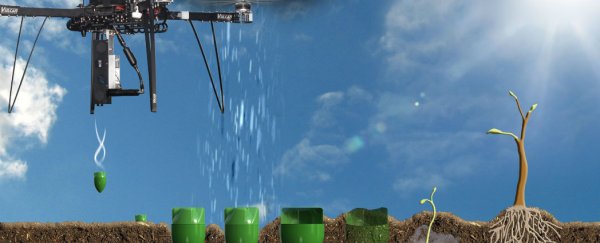US-based organisation, BioCarbon Engineering, has announced that it will begin planting one billion trees per year using drone technology, in an effort to combat the massive levels of deforestation that have affected many of the world's jungles, bushlands, and forests.
Led by ex-NASA engineer, Lauren Fletcher, the team looked at the issue of how rapidly trees are being felled, and reasoned that on their own, people aren't able to combat the problem. So why not use technology to combat technology? "We are going to counter industrial scale deforestation using industrial scale reforestation," they say on their website. "Destruction of global forests from lumber, mining, agriculture, and urban expansion destroys 26 billion trees each year. We believe that this industrial scale deforestation is best combated using the latest automation technologies."
Right now, the rate of reforestation is about half that of deforestation, which is obviously entirely sustainable. Earth will literally run out of trees if we don't come up with a better solution to speed up the process, which is severely held up by hand-planting. What the BioCarbon Engineering team plans to do is fly drones over specially selected planting areas and fire biodegradable plastic pods filled with pre-germinated seeds and highly nutritious soil down into the ground.
Once planted safely, the seeds will be watered and monitored by the drones, which will report back to the team about their health and growth patterns year-round. As Christopher Hootan says at The Independent, "Fletcher doesn't pretend that the method is as good as hand-sowing, but it's a hell of a lot quicker."
Hootan reports that the plan is to plant up to 36,000 trees a day, and at around 15 percent of the cost of traditional reforestation methods.
"The only way we're going to take on these age-old problems is with techniques that weren't available to us before," Fletcher told him. "By using this approach we can meet the scale of the problem out there."
Can't wait to see this project get underway.
